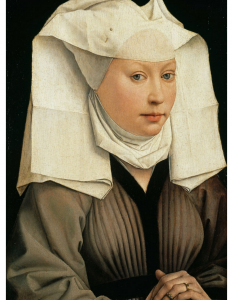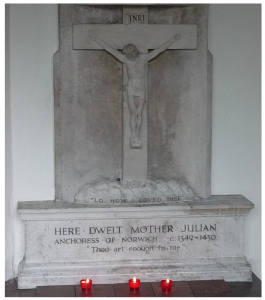
English Anchoress: Julian of Norwich (c.1342-c.1416)
Born “Dame Juliana”, not much is known about her personal life except through her sixteen visions/showings in which scholars and peers unraveled her true passion for Christ. It has been said, that her major works written in the English language were some of the first to survive during this time period from a woman. Taken from St. Julian’s church in Norwich, United Kingdom, is the underlying history behind her name and the discovery of her birth and death place as far as researchers may believe. Most areas of Norwich land were or extreme poverty and famine, which lead the way for Julian to become a mentor and spiritual counselor during the times of negativity and plague (Juliancentre.org, 2017). Unfortunately, at about 33 years old, Julian had become extremely ill and was expected to die, and upon her coming of death she developed a plethora of religious visions which were, according to the Norton Anthology of English Literature, were created at the precise age “of thirty and a half on May 13, 1373” (412). A compilation of Julian’s visions thus paved the way for a collection of surviving texts called the Book of Showings, which is revised into two separate versions (short and long) and uneven chapters within the chapters that create mediations of each chapter (412-413). With poise and optimism from numbers/chapters I-XVI in her showings, Julian expresses the relationship between her physical of sickness as compared to Christ and ending with the sixteenth vision which ties in humanity and her own theories to uncover “‘the ground of our kind [natural/kind] making'” (413). Julian lived on another 30+ years after her “spiritual awakening” and continued to offer wisdom, optimism, and love for the people of Norwich. As readers, we can also better understand the visitations through Margery Kempe’s writings in The Book of Margery Kemp.
Fun Facts:
- It is believed she took the name of St. Julian after whom the church was named.
- Lived during the reign of English Kings Edward III, Richard II, Henry IV.
- Famous quote: “all shall be well, and all shall be well, and all manner of things shall be well”
(Information from: http://www.medieval-life-and-times.info/medieval-women/julian-of-norwich.htm)
“We are all one , and I am sure I saw it for the profit of many other”
-Julian of Norwich

Works Cited:
Greenblatt, Stephen, gen. ed. The Norton Anthology of English Literature. 9th ed. Vol. A. New York: Norton, 2012. Print.
Juliancentre.org. (2017). About Julian of Norwich – Available at: http://juliancentre.org/about/about-julian-of-norwich.html [Accessed 19 Sep. 2017].
Medieval-life-and-times.info. (2017). Julian of Norwich – Available at: http://www.medieval-life-and-times.info/medieval-women/julian-of-norwich.htm [Accessed 19 Sep. 2017].
Pathguy.com. (2017). Introducing “A Book of Showings” by Julian of Norwich – Available at: http://www.pathguy.com/julian.htm
TheFreeDictionary.com. (2017). mediation – Available at: http://www.thefreedictionary.com/mediation
